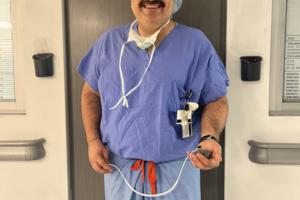Health Advice
/Health

Employers press Congress to cement health price transparency before Trump's return
It seems simple: Require hospitals and insurers to post their negotiated prices for most health care services and — bingo — competition follows, yielding lower costs for consumers.
But nearly four years after the first Trump administration’s regulations forced hospitals to post massive amounts of pricing information online, the effect on ...Read more
Legionella bacteria found in 3 Baltimore City courthouses
BALTIMORE — Traces of Legionella were discovered in three courthouses in Baltimore City, the latest in a series of downtown public facilities where the bacteria has been detected.
Baltimore Mayor Brandon Scott’s office reported that precautionary testing at the Baltimore City District (People’s) Courthouse, the Clarence M. Mitchell, Jr. ...Read more

Emory heart team implants new blood-pumping device for first time in US
ATLANTA — Physicians at Emory University Hospital performed the first-ever surgical implantation in the United States of a brand-new type of heart pump designed to help save patients with heart failure, using a smaller, more comfortable device.
“It’s exciting to see innovation is still happening,” said Dr. Mani Daneshmand, an Emory ...Read more

The ‘choking game’ and other challenges amplified by social media can come with deadly consequences
The “choking game” has potentially deadly consequences, as players are challenged to temporarily strangle themselves by restricting oxygen to the brain. It sounds terrifying, but rough estimates suggest that about 10% of U.S. teenagers may have played this type of game at least once.
There’s more, unfortunately: The Skullbreaker...Read more

Your black plastic kitchen utensils aren't so toxic after all. But you should still toss them, group says
A recent study that recommended toxic chemicals in black plastic products be immediately thrown away included a math error that significantly overstated the risks of contamination, but its authors are standing by their conclusions and warn against using such products.
Published in the peer-reviewed journal Chemosphere, experts from the ...Read more

Ask the Pediatrician: Cold and flu season tips
In most parts of the U.S., fall marks the start of cold and flu season. This means kids will face higher risks of getting sick. Respiratory viruses are usually the culprit and the symptoms they cause can make your child feel miserable.
What can you do to ease aches, sniffles and fever so your child can get better? Here's a closer look at the ...Read more

The rise in children's melatonin use and what experts want you to know
Packed holiday schedules, no school, disrupted bedtime routines — a parent’s worst nightmare. And if you are one of the many turning to melatonin to help their little ones get to sleep, you may want to think again. New research suggests this increasingly popular solution deserves a closer look.
Nearly 1 in 5 school-age children now ...Read more

Avocados, salmon, strawberry yogurt: Which of these meets FDA's new definition of a 'healthy' food?
In an effort to improve American diets, the U.S. Food and Drug Administration on Thursday released a new definition of what it means for a food to qualify as "healthy."
Products like fruit-flavored yogurt, fortified white bread and sweetened energy bars will no longer be allowed to label themselves as healthy if they exceed certain limits on ...Read more

Obamacare sign-ups lag after Trump election, legal challenges
New enrollments under the Affordable Care Act are on pace to trail last year’s record numbers by as many as a million as the outgoing Biden administration confronts upheavals in the program.
Donald Trump’s election to a second term has cast uncertainty around the future of the health law. In addition, the Biden administration implemented ...Read more

Democratic senators ask watchdog agency to investigate Georgia's Medicaid work rule
Three Democratic senators asked the country’s top nonpartisan government watchdog on Tuesday to investigate the costs of a Georgia program that requires some people to work to receive Medicaid coverage.
The program, called “Georgia Pathways to Coverage,” is the nation’s only active Medicaid work requirement.
Pathways has cost tens of ...Read more

How parents can have fun during the holidays, too
The holiday season can be a particularly busy time for families, with everything from mall photos with Santa to class Christmas parties to Elf on the Shelf demanding attention and care. All of that constant fun often leaves out parents, with the season sometimes being more stressful than the rest of the year.
However, the holidays should be ...Read more

There are more heart attacks on Christmas than any other day of the year
We sing about how Christmas brings “tidings of comfort and joy,” but the holiday also brings something not so “merry and bright.”
In fact, heart attacks and strokes surge during the last two weeks of December, according to the American Heart Association, with Dec. 25 being the day of the year with the highest number of cardiac events.
...Read more

Parents and caregivers: How to stop feeling like a Grinch and be more present with your kids this holiday season
Holidays are often depicted as picture-perfect moments: families blissfully united around a table filled with seasonal food favorites against an immaculate backdrop. For many parents, attempting to meet such unrealistic expectations can undermine their self-worth – and their sanity.
In the real world, parents are juggling more ...Read more

Rage has long shadowed American health care. It's rarely produced big change
Among the biggest-grossing films in America in February 2002 were a war drama about American troops in Somalia (“Black Hawk Down”), an Arnold Schwarzenegger action movie (“Collateral Damage”), and a future Oscar winner about a brilliant mathematician struggling with schizophrenia (“A Beautiful Mind”).
But none of these films topped ...Read more

Gov. Gavin Newsom declares emergency in California after CDC confirms severe case of bird flu in Louisiana
California Gov. Gavin Newsom declared a state of emergency Wednesday as the H5N1 bird flu virus moved from the Central Valley to Southern California dairy herds, while federal officials confirmed the first U.S. case of severe illness in a hospitalized Louisiana patient — a concerning development as the virus continues to spread throughout the ...Read more

Gov. Gavin Newsom declares emergency in California after CDC confirms severe case of bird flu in Louisiana
LOS ANGELES — Gov. Gavin Newsom declared a state of emergency as the H5N1 bird flu virus moves from the Central valley to Southern California herds and federal officials confirmed flu in a Louisiana patient hospitalized with severe illness. This is the first case of severe illness caused by bird flu in the U.S., and is considered a concerning ...Read more

California Gov. Gavin Newsom declares state of emergency over bird flu infections
SACRAMENTO, Calif. — Gov. Gavin Newsom declared a state of emergency Wednesday in response to rising cases of bird flu, the same day the U.S. Centers for Disease Control confirmed a person in Louisiana had been hospitalized with a ‘‘severe’’ case of the disease.
“This proclamation is a targeted action to ensure government agencies ...Read more
Detroit cancer center unveils new device for treating liver cancer at home
DETROIT — A new device is now available for treating advanced liver cancer at home using electromagnetic waves, the Barbara Ann Karmanos Cancer Institute announced Wednesday.
Called the "TheraBionic P1," the device works via a small spoon-shaped antenna the patient places on their tongue, said co-inventor Dr. Boris Pasche at a news conference...Read more

Federal government to permanently fund 9/11 health care program facing financial cliff
The pivotal World Trade Center Health Program that covers medical expenses for those suffering from 9/11-related illnesses will be fully funded for the next 15 years, thanks to a bipartisan agreement hammered out in Washington, D.C., officials said Wednesday.
A federal budget bill coming up for a vote next week will include permanent funding ...Read more

Over 162,000 Dreamers cut off from Affordable Care Act insurance
BBarely a month after gaining access to Affordable Care Act coverage for the first time, millions of Dreamers across 19 states were barred from getting health insurance.
A North Dakota federal judge’s ruling prevents Deferred Action for Childhood Arrivals (DACA) immigrants in Kansas, along with 18 other states including Florida, from ...Read more
Popular Stories
- Emory heart team implants new blood-pumping device for first time in US
- Your black plastic kitchen utensils aren't so toxic after all. But you should still toss them, group says
- Legionella bacteria found in 3 Baltimore City courthouses
- Avocados, salmon, strawberry yogurt: Which of these meets FDA's new definition of a 'healthy' food?
- The ‘choking game’ and other challenges amplified by social media can come with deadly consequences








